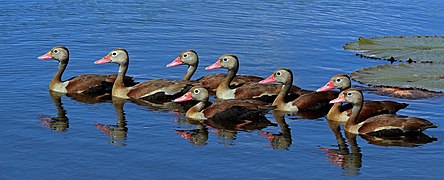Portal:Trinidad and Tobago
Trinidad and Tobago Portal
The Republic of Trinidad and Tobago is a country located at the southern tip of the Caribbean. It borders the countries of Grenada and Venezuela. It was the first Caribbean country to host the Summit of the Americas. It shares maritime boundaries with other nations including Barbados to the northeast, Guyana to the southeast, and Venezuela to the south and west. A treaty between the Republic of Trinidad and Tobago and the Republic of Venezuela on the delimitation of marine and submarine areas, 18 April 1990. The country covers an area of 5,128 square kilometres (1,980 sq mi) and consists of two eponymous main islands, Trinidad and Tobago, and numerous smaller landforms. Trinidad is the larger and more populous of the main islands; Tobago is much smaller, comprising about 6% of the total area and 4% of the entire population which is estimated at 1.3 million (2005). The nation lies outside the hurricane belt. Unlike most of the English-speaking Caribbean, Trinidad and Tobago's economy is primarily industrial with an emphasis on petroleum and petrochemicals. Trinidad and Tobago is well known for its African and Indian cultures, reflected in its large and famous Carnival, Diwali, and Hosay celebrations, as well being the birthplace of steelpan, the limbo, and music styles such as calypso, soca, rapso, parang, chutney, and chutney soca.[1][2][3][4][5][6][7] Selected article -Cyril Lionel Robert James (4 January 1901 – 31 May 1989), who sometimes wrote under the pen-name J. R. Johnson, was a Trinidadian historian, journalist, Trotskyist activist and Marxist writer. His works are influential in various theoretical, social, and historiographical contexts. His work is a staple of Marxism, and he figures as a pioneering and influential voice in postcolonial literature. A tireless political activist, James is the author of the 1937 work World Revolution outlining the history of the Communist International, which stirred debate in Trotskyist circles, and in 1938 he wrote on the Haitian Revolution, The Black Jacobins. Characterised by one literary critic as an "anti-Stalinist dialectician", James was known for his autodidactism, for his occasional playwriting and fiction, and as an avid sportsman. The performance of his 1934 play Toussaint Louverture was the first time black professional actors featured in a production written by a black playwright in the UK. His 1936 book Minty Alley was the first novel by a black West Indian to be published in Britain. He is also famed as a writer on cricket, and his 1963 book Beyond a Boundary, which he himself described as "neither cricket reminiscences nor autobiography", is commonly named as the best single book on cricket, and even the best book about sports ever written. (Full article...)CategoriesSelected quoteIn the newsWikiProject
General imagesThe following are images from various Trinidad and Tobago-related articles on Wikipedia. Selected pictureDid you know
Selected cuisine
Chapati (alternatively spelled chapatti, chappati, chapathi, or chappathi; pronounced as IAST: capātī, capāṭī, cāpāṭi), also known as roti, safati, shabaati, phulka and (in the Maldives) roshi, is an unleavened flatbread originating from the Indian subcontinent and staple in India, Nepal, Bangladesh, Pakistan, Sri Lanka, East Africa, Arabian Peninsula and the Caribbean. Chapatis are made of whole-wheat flour known as atta, mixed into dough with water, oil and optional salt in a mixing utensil called a parat, and are cooked on a tava (flat skillet).
Selected panoramaTopicsLists
Select [►] to view subcategories
Recognized content
Featured articlesFeatured listsGood articles
Did you know? articles
Featured pictures
Featured portalsIn the News articles
Main page featured articlesMain page featured listsPicture of the day pictures
Related portalsWikiProjectsTrinidad and Tobago Wikipedians' Notice Board · Trinidad and Tobago Wikipedians
Associated WikimediaThe following Wikimedia Foundation sister projects provide more on this subject:
Portal informationThis portal is maintained by WikiProject Trinidad and Tobago
Discover Wikipedia using portals |
|||||||||||||||||||||||||||||||||||||||||||||||||||||||||||||||
- ^ "In Trinidad, Diwali Lights Up Like Christmas". NPR. Archived from the original on 17 February 2020. Retrieved 20 March 2019.
- ^ "Diwali in Trinidad and Tobago". trinidad.us. Archived from the original on 2 March 2019. Retrieved 20 March 2019.
- ^ Ingram, Amy. "What is Chutney Music?". Wesleyan University. Archived from the original on 16 July 2011. Retrieved 10 September 2018.
- ^ "Parang Music". Destination Trinidad and Tobago. Archived from the original on 10 September 2018. Retrieved 10 September 2018.
- ^ "Soca Music History". Artdrum. Archived from the original on 19 September 2018. Retrieved 10 September 2018.
- ^ "A brief history of the steel pan". BBC. 24 July 2012.
- ^ "Trinidad Carnival for Beginners". Caribbean Beat. 1 January 1993. Archived from the original on 8 April 2018. Retrieved 10 September 2018.
- Portals with triaged subpages from November 2019
- All portals with triaged subpages
- All portals
- Portals with no named maintainer
- Trinidad and Tobago portal
- Random portal component with 6–10 available subpages
- Random portal component with more available subpages than specified max
- Random portal component with 11–15 available image subpages
- Random portal component with 11–15 available subpages
- Random portal component with 6–10 available image subpages
- Caribbean portals
- Portals by country
- Redirect targets of redirected portals with existing subpages































































